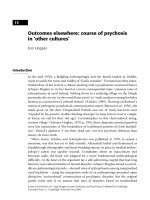Adoption-of-COBR-by-other-states-2012-1
Bạn đang xem bản rút gọn của tài liệu. Xem và tải ngay bản đầy đủ của tài liệu tại đây (201.7 KB, 14 trang )
ADOPTION OF THE CHILDREN’S OUTDOOR BILL OF RIGHTS BY OTHER STATES
TABLE OF CONTENTS
Children’s Outdoor Bill of Rights..........................................................................2
1.California......................................................................................................2
2. Colorado.....................................................................................................2
3. Florida.........................................................................................................3
4. Georgia.......................................................................................................3
5. Illinois..........................................................................................................4
6. Iowa............................................................................................................4
7. Kansas........................................................................................................5
8. Kentucky.....................................................................................................5
9. Maryland.....................................................................................................6
10. Michigan (City of Lansing)........................................................................6
11. Nevada......................................................................................................7
12. New Jersey...............................................................................................7
13. New Mexico..............................................................................................8
14. New York...................................................................................................8
15. North Carolina...........................................................................................9
16. Ohio..........................................................................................................9
17. Oregon....................................................................................................10
18. Tennessee...............................................................................................11
19. Wisconsin...............................................................................................12
20. Wyoming.................................................................................................13
States Without a Children’s Outdoor Bill of Rights............................................14
1
Children’s Outdoor Bill of Rights
1.
California
COBR: Every child should have the opportunity to:
1. Play in a safe place
2. Explore Nature
3. Learn to swim
4. Go fishing
5. Follow a trail
6. Camp under the stars
7. Ride a bike
8. Go boating
9. Connect with the past
10. Plant a seed
Progress: The Children’s Outdoor Bill of Rights was started by the California Roundtable
on Recreation, Parks and Tourism. The Roundtable’s mission is to encourage California’s
children to participate in outdoor recreational activities and discover their heritage.
California’s COBR has been endorsed by numerous community organizations and
government entities. The Roundtable continues to find ways to expand the Children’s
Outdoor Bill of Rights in California and nationally.
Website: />2. Colorado
COBR: With the help of educators, parents, and youth groups, hundreds of kids provided
their opinions to create the Colorado Kids’ Outdoor Bill of Rights. They concluded
kids should be able to:
1.
2.
3.
4.
Camp out under the stars.
Follow a trail, ride it or walk it, and be respectful of everyone’s right to use the trail.
Play in a creek or river: fish, wade, paddle, or skip a stone.
Experience the wonders of Colorado’s four seasons: wildflowers, abundant sunshine,
the changing aspen leaves, and fresh powder snow.
5. Visit a working farm or ranch.
6. Enjoy the view from the top of a mountain.
7. Identify Colorado’s official state wildlife and plants in their natural habitat.
8. Explore one of the dozens of local, state, and national parks in Colorado.
9. Play in the dirt and learn about the world from the ground up.
10. Plant a seed for other Colorado kids to enjoy in the future.
Progress: Colorado’s COBR was part of Lt. Gov. O’Brien’s Colorado Kids Outdoors
Report, released January, 2010. A way “to better understand what kids thought were
essential outdoor experiences and to foster a dialogue with them and between them, Lt.
Governor Barbara O’Brien asked kids to develop a bill of outdoor “rights” proclaiming what
2
every kid should have the opportunity to experience before they grow up” (Lt. Gov
Obrien’s report, p. 14).
English and Spanish versions of the Colorado Kids’ Outdoor Bill of Rights are posted
at: www.colorado.gov/LtGovernor . They are also on The Colorado Tourism Office’s kids’
page: www.colorado.com/ColoradoForKids.aspx
Website:
/>3. Florida
COBR: Every child has the right to:
1. Swim in a healthy lake
2. Build a sandcastle or outdoor fort
3. Camp under the stars
4. Climb a tree
5. Catch a fish
6. Hike a path
7. Watch a bird
8. Listen to a cricket, bird or frog
9. Smell a wildflower
10. Explore nature
11. Volunteer to help wildlife
12. Celebrate Florida’s heritage
Progress: The Get Outdoors Florida! Coalition created the Florida Children’s Outdoor Bill
of Rights and it was instated in March, 2009. The organization, Get Outdoor Florida! is
using the COBR as a promotional tool to encourage children to get outdoors while also
using study results to show that getting outdoors is good for everyone.
Website: />4. Georgia
COBR: The Georgia Children’s Outdoor Bill of Rights states that every child should have
the opportunity to:
1.
2.
3.
4.
5.
Discover Georgia’s Past
Splash in the water
Play in a safe place
Camp under the stars
Explore nature
3
6. Learn to swim
7. Play on a team
8. Follow a trail
9. Catch a fish
10. Celebrate their heritage
Progress: The objective of the Georgia COBR is to make sure all children have the
opportunity to experience each of the activities listed within the state’s COBR by the time
the child is 14 years old. Georgia adopted the COBR due to lack of physical exercise and
increased health risks for children. Clayton Parks in Georgia created a list of research
studies that support the importance of each right in Georgia’s COBR and this bibliography
can be found in the website below.
Website: and
/>5. Illinois
COBR: Every child should have the opportunity to:
1. Discover wilderness-prairies, dunes forests, savannas, and wetlands
2. Camp under the stars
3. Follow a Trail
4. Catch and release fish, frogs, and insects
5. Climb a tree
6. Explore nature in neighborhood and cities
7. Celebrate heritage
8. Plant a flower
9. Play in the mud or a stream
10. Learn to swim
Progress: On June, 1 2009, the Illinois General Assembly passed a joint resolution
supporting its Children’s Outdoor Bill of Rights and officially designating June as “Leave No
Child Inside” month in the State of Illinois.
Website: o/billofrights.php and www.chicagowilderness.org.
6. Iowa
COBR: N/A
Progress: A survey was conducted to get feedback about what activities all children in
Iowa should have the opportunity to participate in. The results of the survey are being
distributed and a COBR will later be developed.
Website: />
4
7. Kansas
COBR: “The Children’s Outdoor Bill of Rights is a listing of 10 outdoor activities that invite
interaction with nature. We believe every child should have the opportunity to”:
1. Walk in the footsteps of Kansas history
2. Access a natural environment
3. Camp under the stars
4. Explore nature
5. Learn to swim
6. Play on a team
7. Follow a trail
8. Participate in the shooting sports
9. Catch fish and harvest game
10. Play in a safe environment
Progress: Limited supplies of posters promoting the Children’s Outdoor Bill of Rights are
available. In addition, 40 indoor and outdoor signs have been distributed to state parks
and selected nature centers around the state. Subway, Kansas Wildscape and Kansas
City Chapter of Safari Club International provided support for this program.
Website: and
/>
8. Kentucky
COBR: The Kentucky Children's Outdoor Rights are acknowledged, declaring that each
Kentucky child, as part of his or her childhood development, has the outdoor right to:
1. Fish, swim, paddle, ski, wade, splash, or otherwise enjoy a Kentucky stream, creek,
river, or lake.
2. Hike, hunt, bird watch, view Elk and other wildlife, and just explore Kentucky's
natural wilderness areas, parks, trails, woods, and natural habitats.
3. Bike in safe areas and routes to schools, recreation and park areas, neighborhood
stores and shops.
4. Live in a community that is safe, attracts people of all walks of life, and has kidfriendly parks within walking distance of their residence.
5. Go to a school that inspires a culture of learning that allows students to participate
in student-driven scheduling, elective offerings, and extracurricular activities.
5
6. Attend a school that provides balanced right- and left-brain learning venues, recruits
teachers that engage students as individuals, provides free play, and includes the
concepts of No Child Left Inside.
7. Assist, advise, and promote access to such areas and opportunities.
Progress: The COBR is still trying to get pushed through the state legislature, and has
support from local school boards and Sen. Julian Carroll. Kids Grow Outdoors, Inc. got the
Kansas COBR in motion.
Website: and />
9. Maryland
COBR: Every Maryland child shall have the opportunity to…
1. Discover & connect with their natural world
2. Play & learn outdoors
3. Splash & swim in the water
4. Camp under the stars
5. Follow a trail
6. Catch a fish
7. Watch wildlife
8. Explore wild places close to home
9. Celebrate their culture & heritage
10. Share nature with a great mentor or teacher
Progress: In 2008, Governor Martin O’Malley established the Maryland Partnership for
Children in Nature. This coalition of state, local, private and non-profit partners promotes
the well-being of youth by expanding opportunities for environmental learning and outdoor
play. In April 2009, O’Malley participated in Earth Day activities with children and then
announced Maryland’s COBR.
Website: and
/>10. Michigan (City of Lansing)
COBR:: Lansing Michigan has developed its Children’s Outdoor Bill of Rights, which I
include:
1. Discover Lansing’s Past
2. Splash in the water
3. Follow a trail
6
4. Protect the environment
5. Camp under the stars
6. Explore nature
7. Be physically active
8. Play on a team
9. Celebrate your heritage
10. Catch a fish
Progress: The City of Lansing is coordinating the efforts of its COBR with Michigan’s No
Child Left Inside Movement. They have created a program to ensure the City’s children
have the opportunity to accomplish each right. During the program, the children can collect
a wristband for each of the ten rights they participate in. Once all ten wristbands are
collected, the child will receive a t-shirt and certificate that signifies the completion of the
program.
Website: />11. Nevada
COBR: The children of Nevada have the right to discover and experience the outdoors
through the following activities:
1.
2.
3.
4.
5.
6.
7.
8.
Create an outdoor adventure
Explore a trail
Camp under the stars
Go fishing
Discover nature
Explore Nevada’s heritage
Go on a picnic
Play in a park; in the water; in the snow; on the rocks
Progress: The Nevada Children’s Outdoor Bill of Rights Alliance (COBRA) consists of
organizations and agencies that have responsibilities or interests in getting kids
outdoors, connected to nature, and physically active. Their website has a link to assist
families and individuals in creating their own outdoor adventures based on the COBR
principles. The website also lists programs within each county where people can sign
their kids up to fulfill the Nevada COBR activities.
Websites: />%20Day/2010/Nevada%20Childrens%20Outdoor%20Bill%20of%20Rights_Talking
%20Points.pdf
and, />12. New Jersey
COBR: Every child has the right and should have opportunities to:
7
1. Explore the woods; climb a tree
2. Run through a field; build a fort
3. Splash in the water; catch a fish
4. Explore a city park; turn over a log
5. Sleep out in a tent; gaze at stars
6. Follow a trail; listen to bird song
7. Play in the mud; hold a frog
8. Plant a garden; eat locally grown food
9. Play in the rain; follow animal tracks
10. Be alone in nature; share it with a friend; and
11. Celebrate New Jersey’s habitats; embrace New Jersey’s natural heritage.
Progress: The Audubon Society of New Jersey is advocating the New Jersey COBR. A
bipartisan resolution passed (R103) in July 2010, instating the New Jersey COBR.
Website: />.pdf
13. New Mexico
COBR:
1. Play outside and freely explore
2. Watch wildlife in the quiet outdoors
3. Wade in a clean river, creek, lake or pond
4. Catch a fish and hunt for food
5. Camp out under the stars
6. Plant a seed and visit farms and ranches
7. Travel a trail
8. Explore New Mexico parks, nature centers and wildlife sanctuaries
9. Actively care for land, water and wildlife
10. Dig in the dirt and learn about the world from the ground
Progress: Although there are no current appropriations funding, the Children’s Outdoor
Bill of Rights will help set the stage for more programs within the Department of Education,
Natural Resources and other agencies at the state level. This will also help draw attention
to the campaign to connect children with nature, and find novel ways to get our kids
outside and moving.
Website: />
8
14. New York
COBR: N/A
Progress: The organization, Children in Nature New York, is developing support for the
New York Children's Outdoor Bill of Rights.
Website: />15. North Carolina
COBR: Every North Carolina child should have the opportunity to discover, explore and
connect with natural spaces and wild places close to home, in neighborhoods and cities in
North Carolina, from the mountains to the sea by:
1. Playing in a safe place outdoors,
2. Camping under the stars, learning to swim, riding a bike,
3. Using their senses to experience the natural world,
4. Visiting a farm, seeing how food is grown, growing something,
5. Exploring a stream, splashing in a wave, catching a fish, stomping in a puddle, playing
in the mud,
6. Hiking in a natural area and following a trail,
7. Rolling in the grass, playing in the sand, climbing a tree or searching under a log,
8. Sharing nature with a parent, guardian, mentor, teacher or environmental educator,
and visiting an environmental education center.
Progress: A contest was held to create a poster to represent the North Carolina COBR.
The winner will be announced very soon. This COBR is an initiative of the North Carolina
Children and Nature Coalition! and Environmental Educators of North Carolina. Currently,
North Carolina is asking community organizations and individuals to become supporters of
the COBR.
Website: and
/>16. Ohio
COBR:
1. Be physically active and play outside every day to grow up healthy: Ohio’s
children should reap the benefits of outdoor activity for their mental/cognitive
development, physical and emotional well-being. This should include access to recess
every school day. The American Academy of Pediatrics (2007), states that every child
should have at least one hour of free play outdoors each and every day.
9
2. Have access to safe, natural green spaces in their community: Children
3.
4.
5.
6.
7.
8.
9.
should be able to safely explore their community and learn to appreciate their natural
surroundings. They need to know the diversity of nature found in their own backyard
and nearby parks. It is important that every child engages in physical activities
including walking and biking around their neighborhood.
Connect with nature, with free time to explore the outdoors: Children benefit
from experiences and reconnecting with nature on a regular basis in backyards,
creeks, and parks, spending leisure playtime immersed in self-initiated activities.
Having unstructured time outdoors allows children to discover the restorative power of
nature.
Discover the wonders of plants and animals, large and small, using all five
senses. Children have an innate curiosity. They need to discover paths that are new
to them and follow trails that show them the wonders of the natural world; to watch
bugs and hear birds; to touch and smell leaves and see creatures crawling on a log.
Explore the diversity of Ohio’s natural habitats: In order to understand and
appreciate Ohio's rich environmental, historical, and cultural past and present,
children need to have ongoing access to natural places. The varied ecosystems of
Ohio offer opportunities for children to race through a prairie, wade in a stream, study
the night sky or climb a tree, while learning about local culture and history.
Understand the patterns and cycles in nature: Children can learn by observing
plant and animal life cycles or watching the sun rise and set each day. They gain an
under-standing of the nurturing capacity of the Earth by digging in the soil, finding
worms, and planting seeds and watching them grow into flowers and food.
Experience the joys of splashing, playing and swimming in safe, clean lakes
and streams: Water is essential to all life on Earth and is an abundant natural
resource in Ohio. Children need to become familiar with water and how it plays a role
in recreation and conservation, from skipping rocks and studying turtles to sloshing in
puddles to fishing and boating.
Be fully immersed in nature by camping overnight, free of the distraction of
electronics: Children, perhaps with family, school or scouting groups, need to spend
time in nature away from computers, television, cell phones and electronic gadgets to
quietly reflect. Every child should have a camp-like experience in nature, well beyond
the one-day field trip during his or her school-age years.
Learn how to give back to nature: Children develop an appreciation and a sense
of responsibility for preserving Ohio’s natural resources by giving back and leaving
nature undisturbed or better than they found it. They learn to value the natural world
through involvement in activities like planting trees or gardening, picking up litter and
recycling, taking part in stream cleanup, wetland and prairie restoration efforts.
Progress: The State of Ohio is publishing a Leave No Child Inside Quarterly Action
Report, which includes COBR updates.
Website: />s_signed_rally_celebrates_oh_leave_no_chi/ and />17. Oregon
COBR: As they grow, every Oregon child should have the opportunity to:
1. Follow a trail
1
0
2. Go boating
3. Camp out under the stars
4. Learn to swim
5. Walk barefoot on the beach
6. Climb a tree
7. Observe animals in their habitat
8. Catch a fish
9. Play in a nearby park
10. Celebrate Oregon’s Culture & History
Progress: The Oregon Parks and Recreation Association (ORPA) is pursuing the creation
and promotion of the Oregon COBR because it believes if all organizations with a shared
mission in outdoor recreation and environmental education adopt and collaborate on a shared
message about children's outdoor activities, the collective outcome will be greater than any
one agency acting alone. Two statewide programs are expected to come from the COBR:
Natures Passport – an outdoor activity punch card that youth and their families complete as
they pursue outdoor activities provided by partner agencies, and the Oregon Children’s
Outdoor Bill of Rights resource website.
Website: />/Oregon_Childrens_Outdoor_Bill_of_Rights.pdf and />%20Form3.pdf
18. Tennessee
COBR: The Tennessee Children’s Outdoor Bill of Rights state that every child, before
entering high school, should have the opportunity to:
1. Walk in the woods
2. Play outside
3. Explore nature
4. Watch wildlife
5. Grow a garden
6. Splash in the water
7. Camp under the stars
8. Learn to swim
9. Climb a tree
10. Go fishing
11. Fly a kite
12. Visit a farm
1
1
Progress: The TN Children's Outdoor Bill of Rights (TCOBOR) has been introduced to the
Tennessee legislature as Senate Joint Resolution 705. More than 100 organizations have
come together to support Every Child Outdoors – Tennessee, including local, state and
national organizations and agencies, governments, non-profits and businesses
representing health, natural resource, education, hunting and fishing, recreation and youth
stakeholders.
Website: and
/>19. Wisconsin
COBR: Every Wisconsin child has the right to:
1. Follow a trail, whether by hiking or biking
2. Visit a working farm
3. Eat healthy and sustainable food
1
2
4. Splash, swim, and play in a clean Wisconsin lake or river
5. Catch and release frogs, fireflies, and insects
6. Tap a maple tree
7. Explore wild places close to home
8. Eat a fish they catch
9. Discover Wisconsin’s diverse wilderness – prairies, forests, wetlands, and beaches
10. Share a hunting experience with a great mentor or teacher
Progress: Wisconsin's Children's Outdoor Bill of Rights is currently a legislative resolution
awaiting confirmation in the Legislature. Wisconsin is asking everyone to come together;
teachers, parents and decision-makers, for the sake of healthy children.
Website: and
/>20. Wyoming
COBR: University of Wyoming Early Care and Education Center Children’s Outdoor Bill of
Rights Children have the right to…
Jump off a rock
Breathe fresh air
Feel grass between their toes
Splash in the water
Follow a trail
Plant a garden Read a book under a tree
Fall down Collect treasures
Dig for worms Swing really, really high
Taste icicles Pick flowers
Listen to the wind in the trees
Smell the rain Look for bugs under rocks
Have a picnic Ride bikes and scooters
Go on a bear hunt Run as fast as they can
Watch the world go by Make mud soup
Play in the mud
Lie on their backs and watch the clouds
Build a fort Scream as loud as they want
Eat snow (not the yellow snow) Listen to birds sing
Take a nap in the shade Wrestle with their friends
Jump in a puddle
Sing and dance
Eat straight from the garden
Climb a tree Look for animal tracks
Be scared of bugs (especially spiders) Hug a tree
Catch snow-flakes on their tongues
Progress: Detailed information about this COBR was not available online.
1
3
Website: />
States without a Children’s Outdoor Bill of Rights
(as of 5/11)
Alabama
New Hampshire
Arizona
Nebraska
Arkansas
North Dakota
Connecticut
Northern Marianas Islands
Delaware
Oklahoma
District of Columbia
Pennsylvania
Guam
Puerto Rico
Hawaii
Rhode Island
Idaho
South Carolina
Indiana
South Dakota
Louisiana
Texas
Maine
Utah
Massachusetts
Vermont
Minnesota
Virginia
Mississippi
Virgin Islands
Missouri
Washington
Montana
West Virginia
1
4









